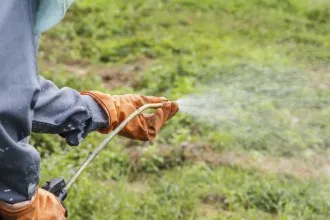More and more research continues to emerge about the dangers of Monsanto’s Roundup. So far the herbicide has been linked to autism, allergies, infertility, and cancer, among other conditions. A recent peer-reviewed study has suggested that Roundup may have another harmful consequence we can add to this already alarming list: antibiotic resistance.
The study, which was published in the journal of The American Society for Microbiology, found that a person exposed to herbicides and antibiotics at the same time will likely need to be treated with higher amounts of antibiotics in order to eliminate an invading bacteria. Even more concerning: Roundup was not the only herbicide implicated. The researchers also tested two other common herbicides, dicamba (commercially called Kamba) and 2,4-dichlorophenoxyacetic acid, and found similar results.
A lot has been said about the way the factory farming practice of pumping livestock full of antibiotics is contributing to the proliferation of antibiotic-resistant bacterial strains, a trend which renowned holistic medicine practitioner Dr. Mercola says “now threatens to revert our medical system back into the pre-antibiotic era when you could die from a common infection.” However, the idea that pesticide use is also contributing to this phenomenon is a new and incredibly worrying concept.
So why do some herbicides appear to contribute to antibiotic resistance? “The way Roundup causes this effect is likely by causing the bacteria to turn on a set of genes that are normally off,” said lead study author Jack Heinemann. When the herbicide activates these genes, it makes it possible for the bacteria to resist antibiotics. So the herbicide may be effectively shielding the bacteria from the antibiotics, and thus making it immune to it.
And according to Amy Westervelt at The Guardian, the amount of herbicide needed to have this effect is no more than what many people are already exposed to in their daily lives.

This means that even if you are purchasing and consuming only organic food, exposure to herbicides from other sources is still very much possible.
More research is needed to determine what ingredient in the herbicides is actually causing these effects, as the studies tested the herbicides as a whole rather than specific ingredients.
For now, here are some steps you can take to AVOID herbicides or minimize exposure:
· Always choose organic. This is the number-one step you can take to do reduce your exposure.
· If you don’t have access to organic produce, wash your produce very very thoroughly.
· Don’t use pesticides or herbicides on your garden or lawn.
· Have people remove their shoes before coming in the house, to avoid tracking the chemicals into your home.
· If you know or suspect that sprayed herbicides or pesticides may be drifting onto your property, report it to your regional EPA office.
-The Alternative Daily
Sources:
http://articles.mercola.com/sites/articles/archive/2015/04/07/cafos-gmos-antibiotics.aspx
http://articles.mercola.com/sites/articles/archive/2013/06/09/monsanto-roundup-herbicide.aspx
http://www.motherearthnews.com/nature-and-environment/pesticide-exposure-zmaz83mjzraw.aspx?PageId=1
http://www.theguardian.com/lifeandstyle/2015/mar/24/pesticides-antibiotic-resistance-study
http://mbio.asm.org/content/6/2/e00009-15.abstract
